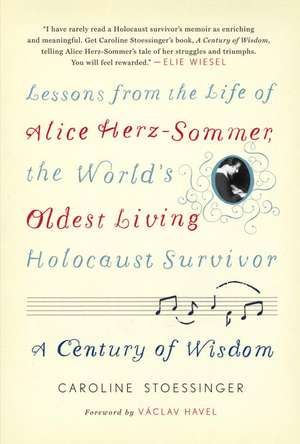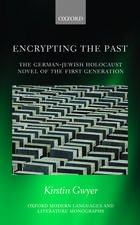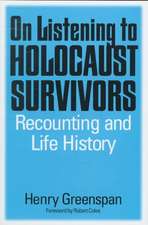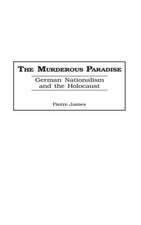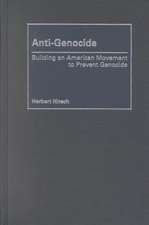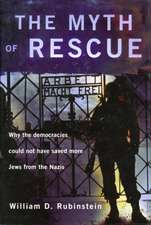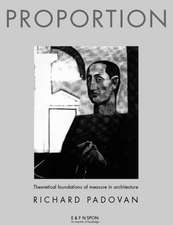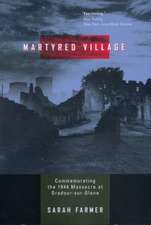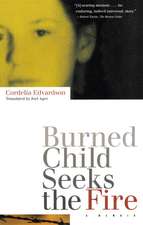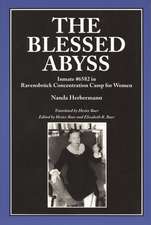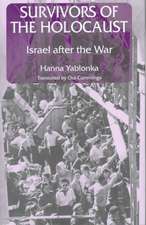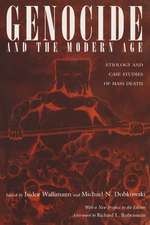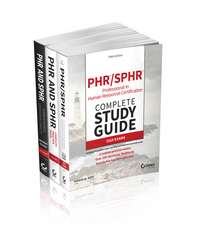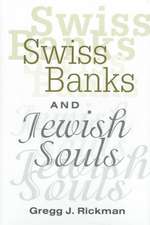A Century of Wisdom: Lessons from the Life of Alice Herz-Sommer, the World's Oldest Living Holocaust Survivor
Autor Caroline Stoessinger Vaclav Havelen Limba Engleză Hardback – 29 feb 2012
At 108 years old, the pianist Alice Herz-Sommer is an eyewitness to the entire last century and the first decade of this one. She has seen it all, surviving the Theresienstadt concentration camp, attending the trial of Adolf Eichmann in Jerusalem, and along the way coming into contact with some of the most fascinating historical figures of our time. As a child in Prague, she spent weekends and holidays in the company of Franz Kafka (whom she knew as “Uncle Franz”), and Gustav Mahler, Sigmund Freud, and Rainer Maria Rilke were friendly with her mother. When Alice moved to Israel after the war, Golda Meir attended her house concerts, as did Arthur Rubinstein, Leonard Bernstein, and Isaac Stern. Today Alice lives in London, where she still practices piano for hours every day.
Despite her imprisonment in Theresienstadt and the murders of her mother, husband, and friends by the Nazis, and much later the premature death of her son, Alice has been victorious in her ability to live a life without bitterness. She credits music as the key to her survival, as well as her ability to acknowledge the humanity in each person, even her enemies. A Century of Wisdom is the remarkable and inspiring story of one woman’s lifelong determination—in the face of some of the worst evils known to man—to find goodness in life. It is a testament to the bonds of friendship, the power of music, and the importance of leading a life of material simplicity, intellectual curiosity, and never-ending optimism.
Foreword by Václav Havel
Preț: 135.09 lei
Nou
Puncte Express: 203
Preț estimativ în valută:
25.85€ • 27.64$ • 21.55£
25.85€ • 27.64$ • 21.55£
Carte indisponibilă temporar
Doresc să fiu notificat când acest titlu va fi disponibil:
Se trimite...
Preluare comenzi: 021 569.72.76
Specificații
ISBN-13: 9780812992816
ISBN-10: 0812992814
Pagini: 232
Dimensiuni: 137 x 193 x 30 mm
Greutate: 0.36 kg
Editura: Spiegel & Grau
ISBN-10: 0812992814
Pagini: 232
Dimensiuni: 137 x 193 x 30 mm
Greutate: 0.36 kg
Editura: Spiegel & Grau
Notă biografică
Caroline Stoessinger, a pianist, has appeared on the stages of Carnegie Hall and Lincoln Center and for twenty-five years has performed with the Tokyo String Quartet and the Brooklyn Philharmonic Orchestra. Stoessinger produced the televised dedication of the Schindler violin at the U.S. Holocaust Memorial Museum and the first New York production of Brundibár. She has played in concert halls from Tokyo and Prague to Spillville, Iowa, and for many years served as the artistic director at the Cathedral of St. John the Divine. She is artistic director of chamber music at the Tilles Center, artist-in-residence at John Jay College, director of the Newberry Chamber Players at the Newberry Opera House, and founder and president of the Mozart Academy. She lives in New York City.
Extras
One
Alice and Franz Kafka
As she unlatched the garden gate, eight-year-old Alice caught her first glimpse of a tall, very thin young man who, many years later, would be known as one of the greatest writers of the twentieth century. Franz Kafka was Uncle Franz to Alice. He had arrived in a horse-drawn cart with a little bunch of multicolored flowers for her mother. As the flowers wilted in the sun, Kafka stopped to feed the horse apples that had fallen to the ground. “Poor Franz,” Alice reminisces. “He apologized for the flowers. But not because of their sad state but because there were so many different colors. He said he just couldn’t decide which color to choose.”
Alice had two older brothers, Georg and Paul, and two sisters, Irma, who was twelve years older than Alice, and Marianne, nicknamed Mitzi, who was Alice’s twin. Irma had become engaged to Felix “Fritz” Weltsch, an outgoing young philosopher who had met Kafka when they both were studying law at Charles University. Rejecting law as their profession, they became fast friends when they worked together in the same insurance firm. Away from work Weltsch pursued a second doctorate in philosophy, while Kafka wrote and began to publish, and together with Max Brod and Oscar Baum they formed a writers’ group, the “Prague Four.” Later they befriended a teenage poet, Franz Werfel.
It was only natural that Weltsch would invite his best friend to meet his future in-laws. “He very often came to our house,” Alice explains. Kafka felt so at ease in the Herzs’ literary and musical home that he became a regular at their Sunday table. “He was [like] a member of our family,” Alice says. Struggling with his Jewish identity, he found the warmth of their secular German Jewish life reassuring. Throughout his life Kafka settled on a kind of middle road with regard to his Jewish heritage, living by Jewish values, without adherence—other than his Bar Mitzvah—to organized religious traditions. He presented himself to the world and to his friends as a member of the European bourgeoisie, impeccably mannered and properly dressed. It is nearly impossible to find a photograph of Kafka casually clothed. As a child Alice thought it was strange that Franz always looked dressed for the office even on outings or picnics.
Observant Alice was quick to analyze and accept Kafka’s ways. He could be depended on to be late, to forget something, and even to lose his way—and then he would arrive apologizing for all of the above. He was so apologetic that it felt to Alice as if he were apologizing for the food he ate or even for simply being alive. But once he got past this, he was a lot of fun, and very responsible with children. In summers Kafka, who was fond of swimming, would organize parties under the Charles Bridge. Alice and Mitzi were often invited, along with Irma and her fiancé. Long before she met Kafka, Alice had become a superb swimmer and had no difficulty racing across the Vltava River.
One of Alice’s most endearing memories of Kafka was the cloudless summer day he showed up unannounced at their country house on the nanny’s day off. The twins were fidgety and impatient; they wanted to explore the nearby forest or go somewhere for a picnic. Kafka suggested a walking expedition in the surrounding countryside. Sofie reluctantly gave her permission, and with Alice and Mitzi as companions, Kafka took off for an adventurous day of exercise and fun. He was a speed walker, having taken up the sport to build strength in his frail body. The little girls did their best to keep up, but after the first mile, they had to slow down and then stop for a break. Kafka found a log the twins could use for a bench and a tree stump for himself. From his perch he commanded their attention with stories about fantastic imaginary beasts. The more they laughed the wilder Kafka’s inventions became. After an hour or so he produced “magic” sandwiches and a thermos of tea, which he claimed an invisible animal, half-bear and half-goat, had left for them in the woods. The great writer-to-be had as much fun as his charges.
Alice would always remember Franz Kafka as an “eternal child.”
From the age of nine Alice would sit beside her mother and listen to Kafka talk endlessly about the book he was writing or the one he wanted to write. Her mother was fascinated with the writer’s gifts, as literature and music had become an escape from her unhappy arranged marriage. Sofie was particularly intrigued by Kafka’s opening sentences, which were modern, even revolutionary in the early years of the twentieth century. He began his novel The Trial with “Someone must have slandered Josef K., for one morning, without having done anything wrong, he was arrested.” The Metamorphosis begins with “When Gregor Samsa woke up one morning from unsettling dreams, he found himself changed in his bed into a monstrous vermin.” And The Castle draws the reader in with “It was late evening when K. arrived.”
Alice would beg him to tell her the stories over and over again. But she always wanted to know the ending—and that he could not answer. He simply could not complete his work. Later on he would write, “I am familiar with indecision, there’s nothing I know so well, but whenever something summons me, I fall flat, worn out by half-hearted inclinations and hesitations over a thousand earlier trivialities.”
When Alice and her mother asked him why he went to law school and became an attorney if he did not want to practice law, Kafka’s answer was simply that he could not decide what to study. He made this doubly clear when, after quitting Richard Lowy’s law firm, he wrote, “It had never been my intention to remain in the legal profession. On October 1, 1906, I entered his service and remained there until October 1, 1907.”
One year Kafka celebrated Passover with the Herz family. Despite his distaste for observing such traditions, he found Passover with Alice’s relatives a joyful family affair. He seemed to tolerate and even accept in the Herz home precisely what he despised in his own family, especially his father’s hypocritical annual practice of Jewish traditions. In A Letter to His Father, Kafka wrote, “I could not understand how, with the insignificant scrap of Judaism you yourself possessed, you could reproach me. . . . Four days a year you went to the synagogue, where you were . . . closer to the indifferent than to those who took it seriously.”
At holiday time Sofie’s Orthodox mother, Fanny, who lived with them, took over the kitchen and did her best to observe the Passover traditions. With the help of the maid, Fanny made kosher chicken soup, matzo balls, and the most tender brisket of beef. A few days before the holiday, she disposed of all leftover breads and pastries made with yeast and cleaned the cooking utensils, plates, and glasses with boiling water. Sofie and the children helped with the housecleaning. They polished the silver and set out their finest table linens. Alice was the most industrious, working hard to gain both her mother’s and her grandmother’s approval.
Alice’s father, who was usually excessively frugal, opened his home to friends—gentiles, neighbors, strangers, and the poor—for the holiday, in keeping with the tradition. He also invited the most senior of his factory workers to share in the seder feast. In 1912, the year that Kafka probably participated, the Herz seder was one of their largest and, aside from the family and Felix, included Kafka, neighbors, several factory workers, and the writer Oskar Baum. Irma cautioned Alice to treat Baum, who was blind, just like anyone else. Much later, when Max Brod wrote about Kafka’s first meeting with Baum, Alice recognized her sister’s advice as a seminal moment in her moral education. As Brod was introducing them, Kafka silently bowed to Baum, greeting the blind man as an equal. “That was what he was like,” Baum said. “Superior in depth of humanity to the ordinary run of kindness.”
Alice does not recall all who came for the holiday that year. What she remembers is folding the snow-white linen napkins, so she knows there were many guests at the table that evening. Alice also thinks that Kafka asked her to sit next to him.
It was the duty of Alice and Mitzi to distribute the Haggadoth, the booklets recounting the story of Passover. Friedrich Herz, who had also been raised Orthodox, led the abridged readings in German; Alice and Mitzi, who were the youngest, read the four questions together; their father explained the ancient meaning of Passover; and Kafka helped the girls search for the afikomen. They all repeated the ancient text “This year we are here, next year in Jerusalem.” No one, with the possible exception of Kafka, could have imagined that Jerusalem would become their safe haven in less than thirty years. When their father led “Dayenu,” the children’s favorite Passover song, in his rich baritone voice, everyone, even Kafka, sang. When the men retired to the living room for fine French brandy and cigars, they asked eight-year-old Alice to play. She obliged with a bagatelle by Beethoven and a Chopin waltz.
Kafka frequently fell in love. Although he made it clear that he dreamed of marriage, he complained that no one understood him. “To have one person with this understanding, a woman for example, . . . would mean to have God,” he wrote in his diary. He was not looking for a wife who insisted on crystal chandeliers and—as Alice says—“that heavy German furniture.” But Alice and her mother were certain that he would never decide to marry. He introduced Felice Bauer to them as his fiancée, then broke off the engagement only to get engaged to her a second time—for just a few weeks, until he changed his mind again. Hoping to comfort him, Alice’s mother suggested to Kafka that he, like Beethoven and Brahms, was an artist and that he belonged to the world rather than to one woman.
But that was before Dora. Both Alice and her mother felt that twenty-five-year-old Dora Diamant was a different and affirmative presence in his life. Alice’s mother said Franz had found his own true nature in Dora, and she hoped he would marry her. Thinking back to those days, Alice feels that her mother was instinctively right. Kafka was attracted to Dora’s independent spirit as well as her motherly gentleness. Watching her scaling and gutting fish in the kitchen of a summer camp, he disapprovingly blurted out, “Such gentle hands and such bloody work.” Dora was embarrassed. Brod revealed, “That was the beginning of his friendship with Dora Diamant, his life’s companion.”
Like Kafka’s mother, Dora had been raised Orthodox, but like Kafka, she had escaped from her family’s plans for her life. Even though Kafka had suffered through his Bar Mitzvah in 1896, he had since declared himself an atheist and a socialist. Dora’s family had insisted that she marry early and aspired for her to be a wife and mother. Dora literally ran away from home to Berlin to get an education, and became a kindergarten teacher. She had leaned toward Zionism and shared Kafka’s interest in Yiddish literature, later influencing his fascination with the Talmud. When she and Kafka began living together in Berlin, it was, they said, their first step toward a permanent home together in Palestine.
It was clear that Dora loved Kafka completely. When they first met and fell instantly in love, Kafka was forty years old, fifteen years older than Dora and already suffering with tuberculosis. As his disease soon required hospitalization, he was admitted to a sanatorium in Kierling, near Vienna. Alice remembers her mother’s concern when Dora moved into Kafka’s room to help care for him day and night. Miraculously, she never contracted tuberculosis. For a time he seemed to improve and even wrote cheerful letters to Alice’s family. Even so, their time together was short-lived. Barely a year after their love affair started, on June 3, 1924, Kafka died, just as he was about to become famous.
Kafka’s body was brought back to Prague for burial in Stranice, the New Jewish Cemetery. Together with her entire family Alice attended his funeral in the cemetery chapel. Alice was nearly twenty-one by that time and well on her way to her own celebrity as a pianist.
Alice would see Dora once again—in 1950 in Israel, where Alice had immigrated after the war. Dora had settled in England, having escaped Stalin’s Russia and Hitler’s Holocaust; she had married and had a daughter. Because she had been an impassioned Zionist, Dora’s single visit to Israel was a dream come true. Again Alice, Dora, and Felix Weltsch shared stories about Kafka, and pondered whether he would have been pleased or frightened by his posthumous fame. If he had lived, would he have agreed finally to marry Dora? Often calling herself Dora Kafka, Dora still believed that she would have been his wife, whereas Alice was certain he might have found some clever way out of the decision.
Alice has never stopped thinking about Kafka and his kindness to her. But why was he so indecisive? Why did he leave his books without endings? After many years of mulling it over, talking with Brod, and reading numerous books on Kafka, Alice has a theory—not found in any of the biographies of him she owns.
Alice explains that Kafka’s mother was Orthodox, whereas his very strict and—according to Franz—somewhat cruel father was completely secular, maybe even an atheist. If Kafka practiced his mother’s faith, he would face his father’s wrath. And to renounce the religion of his mother and her ancestors would be to profoundly hurt the one who gave him life. Alice concludes, “Kafka never knew where he belonged, was never certain of his identity, or which path to take. To choose would mean that he would disappoint one of his parents. This, I think, was the core of his problem.”
Alice notes that Kafka himself might be amused that scholars today debate his work in a Kafkaesque way. Some say his writings have nothing to do with Judaism or with his Jewish roots. Other scholars declare his work to be completely Jewish writing.
Alice accepts both verdicts as partially true.
Interlude
An Emerald Ring
“He was not very beautiful—not good-looking at all,” Alice muses. “But he was oh, so charming. Women were crazy for him.” She is referring to Kafka’s confidant and biographer Max Brod. Having known each other in Prague—Brod wrote rave reviews of Alice’s first concerts and was a good friend of Alice’s family—Alice and Brod reconnected as immigrants in Israel after Alice arrived in 1949.
Always a ladies’ man, Brod was currently smitten with Annie, a red-haired young Russian woman. He had decided that this beauty should improve her piano skills under Alice’s expert guidance. Because he was a friend and one of the few connections to her past life in Prague, Alice agreed to squeeze the unlikely student into her schedule.
Alice and Franz Kafka
As she unlatched the garden gate, eight-year-old Alice caught her first glimpse of a tall, very thin young man who, many years later, would be known as one of the greatest writers of the twentieth century. Franz Kafka was Uncle Franz to Alice. He had arrived in a horse-drawn cart with a little bunch of multicolored flowers for her mother. As the flowers wilted in the sun, Kafka stopped to feed the horse apples that had fallen to the ground. “Poor Franz,” Alice reminisces. “He apologized for the flowers. But not because of their sad state but because there were so many different colors. He said he just couldn’t decide which color to choose.”
Alice had two older brothers, Georg and Paul, and two sisters, Irma, who was twelve years older than Alice, and Marianne, nicknamed Mitzi, who was Alice’s twin. Irma had become engaged to Felix “Fritz” Weltsch, an outgoing young philosopher who had met Kafka when they both were studying law at Charles University. Rejecting law as their profession, they became fast friends when they worked together in the same insurance firm. Away from work Weltsch pursued a second doctorate in philosophy, while Kafka wrote and began to publish, and together with Max Brod and Oscar Baum they formed a writers’ group, the “Prague Four.” Later they befriended a teenage poet, Franz Werfel.
It was only natural that Weltsch would invite his best friend to meet his future in-laws. “He very often came to our house,” Alice explains. Kafka felt so at ease in the Herzs’ literary and musical home that he became a regular at their Sunday table. “He was [like] a member of our family,” Alice says. Struggling with his Jewish identity, he found the warmth of their secular German Jewish life reassuring. Throughout his life Kafka settled on a kind of middle road with regard to his Jewish heritage, living by Jewish values, without adherence—other than his Bar Mitzvah—to organized religious traditions. He presented himself to the world and to his friends as a member of the European bourgeoisie, impeccably mannered and properly dressed. It is nearly impossible to find a photograph of Kafka casually clothed. As a child Alice thought it was strange that Franz always looked dressed for the office even on outings or picnics.
Observant Alice was quick to analyze and accept Kafka’s ways. He could be depended on to be late, to forget something, and even to lose his way—and then he would arrive apologizing for all of the above. He was so apologetic that it felt to Alice as if he were apologizing for the food he ate or even for simply being alive. But once he got past this, he was a lot of fun, and very responsible with children. In summers Kafka, who was fond of swimming, would organize parties under the Charles Bridge. Alice and Mitzi were often invited, along with Irma and her fiancé. Long before she met Kafka, Alice had become a superb swimmer and had no difficulty racing across the Vltava River.
One of Alice’s most endearing memories of Kafka was the cloudless summer day he showed up unannounced at their country house on the nanny’s day off. The twins were fidgety and impatient; they wanted to explore the nearby forest or go somewhere for a picnic. Kafka suggested a walking expedition in the surrounding countryside. Sofie reluctantly gave her permission, and with Alice and Mitzi as companions, Kafka took off for an adventurous day of exercise and fun. He was a speed walker, having taken up the sport to build strength in his frail body. The little girls did their best to keep up, but after the first mile, they had to slow down and then stop for a break. Kafka found a log the twins could use for a bench and a tree stump for himself. From his perch he commanded their attention with stories about fantastic imaginary beasts. The more they laughed the wilder Kafka’s inventions became. After an hour or so he produced “magic” sandwiches and a thermos of tea, which he claimed an invisible animal, half-bear and half-goat, had left for them in the woods. The great writer-to-be had as much fun as his charges.
Alice would always remember Franz Kafka as an “eternal child.”
From the age of nine Alice would sit beside her mother and listen to Kafka talk endlessly about the book he was writing or the one he wanted to write. Her mother was fascinated with the writer’s gifts, as literature and music had become an escape from her unhappy arranged marriage. Sofie was particularly intrigued by Kafka’s opening sentences, which were modern, even revolutionary in the early years of the twentieth century. He began his novel The Trial with “Someone must have slandered Josef K., for one morning, without having done anything wrong, he was arrested.” The Metamorphosis begins with “When Gregor Samsa woke up one morning from unsettling dreams, he found himself changed in his bed into a monstrous vermin.” And The Castle draws the reader in with “It was late evening when K. arrived.”
Alice would beg him to tell her the stories over and over again. But she always wanted to know the ending—and that he could not answer. He simply could not complete his work. Later on he would write, “I am familiar with indecision, there’s nothing I know so well, but whenever something summons me, I fall flat, worn out by half-hearted inclinations and hesitations over a thousand earlier trivialities.”
When Alice and her mother asked him why he went to law school and became an attorney if he did not want to practice law, Kafka’s answer was simply that he could not decide what to study. He made this doubly clear when, after quitting Richard Lowy’s law firm, he wrote, “It had never been my intention to remain in the legal profession. On October 1, 1906, I entered his service and remained there until October 1, 1907.”
One year Kafka celebrated Passover with the Herz family. Despite his distaste for observing such traditions, he found Passover with Alice’s relatives a joyful family affair. He seemed to tolerate and even accept in the Herz home precisely what he despised in his own family, especially his father’s hypocritical annual practice of Jewish traditions. In A Letter to His Father, Kafka wrote, “I could not understand how, with the insignificant scrap of Judaism you yourself possessed, you could reproach me. . . . Four days a year you went to the synagogue, where you were . . . closer to the indifferent than to those who took it seriously.”
At holiday time Sofie’s Orthodox mother, Fanny, who lived with them, took over the kitchen and did her best to observe the Passover traditions. With the help of the maid, Fanny made kosher chicken soup, matzo balls, and the most tender brisket of beef. A few days before the holiday, she disposed of all leftover breads and pastries made with yeast and cleaned the cooking utensils, plates, and glasses with boiling water. Sofie and the children helped with the housecleaning. They polished the silver and set out their finest table linens. Alice was the most industrious, working hard to gain both her mother’s and her grandmother’s approval.
Alice’s father, who was usually excessively frugal, opened his home to friends—gentiles, neighbors, strangers, and the poor—for the holiday, in keeping with the tradition. He also invited the most senior of his factory workers to share in the seder feast. In 1912, the year that Kafka probably participated, the Herz seder was one of their largest and, aside from the family and Felix, included Kafka, neighbors, several factory workers, and the writer Oskar Baum. Irma cautioned Alice to treat Baum, who was blind, just like anyone else. Much later, when Max Brod wrote about Kafka’s first meeting with Baum, Alice recognized her sister’s advice as a seminal moment in her moral education. As Brod was introducing them, Kafka silently bowed to Baum, greeting the blind man as an equal. “That was what he was like,” Baum said. “Superior in depth of humanity to the ordinary run of kindness.”
Alice does not recall all who came for the holiday that year. What she remembers is folding the snow-white linen napkins, so she knows there were many guests at the table that evening. Alice also thinks that Kafka asked her to sit next to him.
It was the duty of Alice and Mitzi to distribute the Haggadoth, the booklets recounting the story of Passover. Friedrich Herz, who had also been raised Orthodox, led the abridged readings in German; Alice and Mitzi, who were the youngest, read the four questions together; their father explained the ancient meaning of Passover; and Kafka helped the girls search for the afikomen. They all repeated the ancient text “This year we are here, next year in Jerusalem.” No one, with the possible exception of Kafka, could have imagined that Jerusalem would become their safe haven in less than thirty years. When their father led “Dayenu,” the children’s favorite Passover song, in his rich baritone voice, everyone, even Kafka, sang. When the men retired to the living room for fine French brandy and cigars, they asked eight-year-old Alice to play. She obliged with a bagatelle by Beethoven and a Chopin waltz.
Kafka frequently fell in love. Although he made it clear that he dreamed of marriage, he complained that no one understood him. “To have one person with this understanding, a woman for example, . . . would mean to have God,” he wrote in his diary. He was not looking for a wife who insisted on crystal chandeliers and—as Alice says—“that heavy German furniture.” But Alice and her mother were certain that he would never decide to marry. He introduced Felice Bauer to them as his fiancée, then broke off the engagement only to get engaged to her a second time—for just a few weeks, until he changed his mind again. Hoping to comfort him, Alice’s mother suggested to Kafka that he, like Beethoven and Brahms, was an artist and that he belonged to the world rather than to one woman.
But that was before Dora. Both Alice and her mother felt that twenty-five-year-old Dora Diamant was a different and affirmative presence in his life. Alice’s mother said Franz had found his own true nature in Dora, and she hoped he would marry her. Thinking back to those days, Alice feels that her mother was instinctively right. Kafka was attracted to Dora’s independent spirit as well as her motherly gentleness. Watching her scaling and gutting fish in the kitchen of a summer camp, he disapprovingly blurted out, “Such gentle hands and such bloody work.” Dora was embarrassed. Brod revealed, “That was the beginning of his friendship with Dora Diamant, his life’s companion.”
Like Kafka’s mother, Dora had been raised Orthodox, but like Kafka, she had escaped from her family’s plans for her life. Even though Kafka had suffered through his Bar Mitzvah in 1896, he had since declared himself an atheist and a socialist. Dora’s family had insisted that she marry early and aspired for her to be a wife and mother. Dora literally ran away from home to Berlin to get an education, and became a kindergarten teacher. She had leaned toward Zionism and shared Kafka’s interest in Yiddish literature, later influencing his fascination with the Talmud. When she and Kafka began living together in Berlin, it was, they said, their first step toward a permanent home together in Palestine.
It was clear that Dora loved Kafka completely. When they first met and fell instantly in love, Kafka was forty years old, fifteen years older than Dora and already suffering with tuberculosis. As his disease soon required hospitalization, he was admitted to a sanatorium in Kierling, near Vienna. Alice remembers her mother’s concern when Dora moved into Kafka’s room to help care for him day and night. Miraculously, she never contracted tuberculosis. For a time he seemed to improve and even wrote cheerful letters to Alice’s family. Even so, their time together was short-lived. Barely a year after their love affair started, on June 3, 1924, Kafka died, just as he was about to become famous.
Kafka’s body was brought back to Prague for burial in Stranice, the New Jewish Cemetery. Together with her entire family Alice attended his funeral in the cemetery chapel. Alice was nearly twenty-one by that time and well on her way to her own celebrity as a pianist.
Alice would see Dora once again—in 1950 in Israel, where Alice had immigrated after the war. Dora had settled in England, having escaped Stalin’s Russia and Hitler’s Holocaust; she had married and had a daughter. Because she had been an impassioned Zionist, Dora’s single visit to Israel was a dream come true. Again Alice, Dora, and Felix Weltsch shared stories about Kafka, and pondered whether he would have been pleased or frightened by his posthumous fame. If he had lived, would he have agreed finally to marry Dora? Often calling herself Dora Kafka, Dora still believed that she would have been his wife, whereas Alice was certain he might have found some clever way out of the decision.
Alice has never stopped thinking about Kafka and his kindness to her. But why was he so indecisive? Why did he leave his books without endings? After many years of mulling it over, talking with Brod, and reading numerous books on Kafka, Alice has a theory—not found in any of the biographies of him she owns.
Alice explains that Kafka’s mother was Orthodox, whereas his very strict and—according to Franz—somewhat cruel father was completely secular, maybe even an atheist. If Kafka practiced his mother’s faith, he would face his father’s wrath. And to renounce the religion of his mother and her ancestors would be to profoundly hurt the one who gave him life. Alice concludes, “Kafka never knew where he belonged, was never certain of his identity, or which path to take. To choose would mean that he would disappoint one of his parents. This, I think, was the core of his problem.”
Alice notes that Kafka himself might be amused that scholars today debate his work in a Kafkaesque way. Some say his writings have nothing to do with Judaism or with his Jewish roots. Other scholars declare his work to be completely Jewish writing.
Alice accepts both verdicts as partially true.
Interlude
An Emerald Ring
“He was not very beautiful—not good-looking at all,” Alice muses. “But he was oh, so charming. Women were crazy for him.” She is referring to Kafka’s confidant and biographer Max Brod. Having known each other in Prague—Brod wrote rave reviews of Alice’s first concerts and was a good friend of Alice’s family—Alice and Brod reconnected as immigrants in Israel after Alice arrived in 1949.
Always a ladies’ man, Brod was currently smitten with Annie, a red-haired young Russian woman. He had decided that this beauty should improve her piano skills under Alice’s expert guidance. Because he was a friend and one of the few connections to her past life in Prague, Alice agreed to squeeze the unlikely student into her schedule.
Recenzii
"A treasure trove of insight and reflection. Herz-Sommer's life is a tribute to the purity of artistic endeavor under the most devastating circumstances, and her refusal to be bitterly defined or essentially reshaped by tragedy is a testament to moral and spiritual courage."—Booklist
"A survivor of Theresienstadt and a world-class Czech pianist shares her amazing story of survival and triumph. Now living in London since she relocated from Jerusalem to be closer to her only son (now deceased), Herz-Sommer is shortly turning 108, still playing the piano, disciplined and abstemious in her daily habits and fairly active, as Stoessinger records over interviews with her between 2004 and 2011. These are short segments that amplify important aspects of her life, such as her acquaintanceship as a young girl in Prague with Franz Kafka and his circle, her happy though too-brief marriage and successful early career as a concert pianist and teacher, the birth of her son in 1937 just as the Nazis were exerting their terror over the Jewish community in Prague and their abrupt deportation to Theresienstadt in 1943. …[W]hat Stoessinger’s work reveals startlingly and firsthand are details of life in the concentration camp, especially how the musicians coped with the horrible conditions and even formed a vibrant community. … 'Every concert played there,' Stoessinger writes, 'became a moral victory against the enemy.' … Rounding out this work are memories from Herz-Sommer’s students and friends, reflections on favorite authors such as Spinoza, Rilke and Zweig and even recipes."—Kirkus Reviews
"As if her 108 years of experience alone were not enough to coax you, there is the overarching fact that draws people to Herz-Sommer’s story: She survived the Theresienstadt concentration camp and is believed to be the oldest living Holocaust survivor."--The Washington Post
“I have rarely read a Holocaust survivor’s memoir as enriching and meaningful. Get Caroline Stoessinger’s book, A Century of Wisdom, telling Alice Herz-Sommer’s tale of her struggles and triumphs. You will feel rewarded.”—Elie Wiesel
“A Century of Wisdom is a stately and elegant book about an artist who found deliverance in her passion for music. Caroline Stoessinger writes with a special purity, as though she were arranging pearls on a string of silk.”—Pat Conroy
“As one of millions who fell in love on YouTube with Alice Herz-Sommer, a 108-year-old Holocaust survivor who plays the piano and greets each day with no hint of bitterness, I’m grateful to Caroline Stoessinger for writing a book that explains this mystery. You will be inspired by the story of Alice Herz-Sommer, who lives to teach us.”—Gloria Steinem
“I walked on the cobblestones in Prague for thirty years wondering who might have walked on them before me: Kafka, Freud, Mahler. It feels like a miracle to have encountered, in Caroline Stoessinger’s wonderful book, Alice Herz-Sommer, who walked with them all—with a heart full of music.”—Peter Sis
“Caroline Stoessinger’s celebration of music and life and of the meaning and legacy of Alice Herz-Sommer’s remarkable, love-filled journey across the bitter, hate-filled years of twentieth-century madness is lyrical, compelling, and profoundly moving. This is an extraordinary, enchanting, entirely inspiring book—most timely and needed now.”—Blanche Wiesen Cook
"A survivor of Theresienstadt and a world-class Czech pianist shares her amazing story of survival and triumph. Now living in London since she relocated from Jerusalem to be closer to her only son (now deceased), Herz-Sommer is shortly turning 108, still playing the piano, disciplined and abstemious in her daily habits and fairly active, as Stoessinger records over interviews with her between 2004 and 2011. These are short segments that amplify important aspects of her life, such as her acquaintanceship as a young girl in Prague with Franz Kafka and his circle, her happy though too-brief marriage and successful early career as a concert pianist and teacher, the birth of her son in 1937 just as the Nazis were exerting their terror over the Jewish community in Prague and their abrupt deportation to Theresienstadt in 1943. …[W]hat Stoessinger’s work reveals startlingly and firsthand are details of life in the concentration camp, especially how the musicians coped with the horrible conditions and even formed a vibrant community. … 'Every concert played there,' Stoessinger writes, 'became a moral victory against the enemy.' … Rounding out this work are memories from Herz-Sommer’s students and friends, reflections on favorite authors such as Spinoza, Rilke and Zweig and even recipes."—Kirkus Reviews
"As if her 108 years of experience alone were not enough to coax you, there is the overarching fact that draws people to Herz-Sommer’s story: She survived the Theresienstadt concentration camp and is believed to be the oldest living Holocaust survivor."--The Washington Post
“I have rarely read a Holocaust survivor’s memoir as enriching and meaningful. Get Caroline Stoessinger’s book, A Century of Wisdom, telling Alice Herz-Sommer’s tale of her struggles and triumphs. You will feel rewarded.”—Elie Wiesel
“A Century of Wisdom is a stately and elegant book about an artist who found deliverance in her passion for music. Caroline Stoessinger writes with a special purity, as though she were arranging pearls on a string of silk.”—Pat Conroy
“As one of millions who fell in love on YouTube with Alice Herz-Sommer, a 108-year-old Holocaust survivor who plays the piano and greets each day with no hint of bitterness, I’m grateful to Caroline Stoessinger for writing a book that explains this mystery. You will be inspired by the story of Alice Herz-Sommer, who lives to teach us.”—Gloria Steinem
“I walked on the cobblestones in Prague for thirty years wondering who might have walked on them before me: Kafka, Freud, Mahler. It feels like a miracle to have encountered, in Caroline Stoessinger’s wonderful book, Alice Herz-Sommer, who walked with them all—with a heart full of music.”—Peter Sis
“Caroline Stoessinger’s celebration of music and life and of the meaning and legacy of Alice Herz-Sommer’s remarkable, love-filled journey across the bitter, hate-filled years of twentieth-century madness is lyrical, compelling, and profoundly moving. This is an extraordinary, enchanting, entirely inspiring book—most timely and needed now.”—Blanche Wiesen Cook
Descriere
An inspiring story of resilience and the power of optimism--the true story of Alice Herz-Sommer, the world's oldest living Holocaust survivor. "A Century of Wisdom" is the remarkable and inspiring story of one woman's lifelong determination--in the face of some of the worst evils known to man--to find goodness in life.
